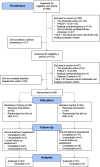Resistance training for Black men with depressive symptoms: a pilot randomized controlled trial to assess acceptability, feasibility, and preliminary efficacy
- PMID: 35448974
- PMCID: PMC9022309
- DOI: 10.1186/s12888-022-03935-x
Resistance training for Black men with depressive symptoms: a pilot randomized controlled trial to assess acceptability, feasibility, and preliminary efficacy
Abstract
Background: Depression is under-recognized in Black men, who are less likely to seek or have access to psychiatric treatment. Resistance training (RT; i.e., weight lifting) can improve depressive symptoms and may be more acceptable to Black men, but its effects have not been examined for Black men with depressive symptoms.
Methods: Fifty Black men with depressive symptoms were randomized to either (a) 12 weeks of RT (coupled with Behavioral Activation techniques to promote adherence) or (b) an attention-control group (Health, Wellness, and Education; HWE). Both groups met twice/week for 12 weeks, and follow-up assessments were done at end-of-treatment (EOT) and 6 months after enrollment. Changes in physical activity and muscular strength were collected as a manipulation check. The primary outcome was interviewer assessed symptoms of depression using the Quick Inventory of Depression Symptomology (QIDS). Secondary outcomes included self-reported depressive symptoms, anxiety, and stress. The association between change in QIDS from baseline to EOT and concurrent changes in physical activity and muscular strength in the RT group were explored as an initial assessment of mechanism. Longitudinal mixed effects regression models with subject-specific intercepts were used to examine intervention effects.
Results: A sample with high rates of medical comorbidities (e.g., 44% HIV positive), substance use (e.g., 34% smoking), and negative social determinates of health (e.g., 50% unemployed) was enrolled. Recruitment, engagement, and retention data indicate that the intervention and design were feasible. The RT group showed greater gains in self-reported exercise (b = 270.94, SE = 105.69, p = .01) and muscular strength (b = 11.71, SE = 4.23, p = .01 for upper body and b = 4.24, SE = 2.02, p = .04 for lower body) than the HWE group. The RT group had greater reductions in QIDS scores at both EOT (b = -3.00, SE = 1.34, p = .01) and 6 months (b = -2.63, SE = 1.81, p = .04). The RT group showed a greater reduction in anxiety at EOT (b = -2.67, SE = 1.06, p = .02). Findings regarding self-reported depressive symptoms and stress were non-significant, but in the expected direction with effect sizes in the small to medium range. In the RT group, improvement on the QIDS between baseline and EOT was associated with concurrent improvements in physical activity (b = 21.03, SE = 11.16, p = .02) and muscular strength (b = 1.27, SE = .44, p = .03 for upper body and b = .75, SE = .14, p = .03 for lower body).
Conclusions: Results suggest that RT is feasible and may be efficacious for reducing depressive symptoms among underserved urban Black men.
Trial registration: ClinicalTrial.gov #: NCT03107039 (Registered 11/04/2017).
Keywords: Behavioral activation; Depression; Resistance Training; Weightlifting.
© 2022. The Author(s).
Conflict of interest statement
The authors declare that they have no competing interests.
Figures
Similar articles
-
Effects of resistance training on depression and cardiovascular disease risk in Black men: Protocol for a randomized controlled trial.Ment Health Phys Act. 2019 Oct;17:100299. doi: 10.1016/j.mhpa.2019.100299. Epub 2019 Sep 12. Ment Health Phys Act. 2019. PMID: 32863882 Free PMC article.
-
Web-Based Intervention Using Behavioral Activation and Physical Activity for Adults With Depression (The eMotion Study): Pilot Randomized Controlled Trial.J Med Internet Res. 2018 Jul 16;20(7):e10112. doi: 10.2196/10112. J Med Internet Res. 2018. PMID: 30012547 Free PMC article. Clinical Trial.
-
Individualized Web-Based Exercise for the Treatment of Depression: Randomized Controlled Trial.JMIR Ment Health. 2018 Oct 12;5(4):e10698. doi: 10.2196/10698. JMIR Ment Health. 2018. PMID: 30314962 Free PMC article.
-
Pilot evaluation on an adapted tele-behavioral activation to increase physical activity in persons with depression: a single-arm pilot study.BMC Psychol. 2024 Nov 9;12(1):643. doi: 10.1186/s40359-024-02053-5. BMC Psychol. 2024. PMID: 39522018 Free PMC article. Clinical Trial.
-
Novel Augmentation Strategies in Major Depression.Dan Med J. 2017 Apr;64(4):B5338. Dan Med J. 2017. PMID: 28385173 Review.
Cited by
-
Effects and neural mechanisms of different physical activity on major depressive disorder based on cerebral multimodality monitoring: a narrative review.Front Hum Neurosci. 2024 Aug 12;18:1406670. doi: 10.3389/fnhum.2024.1406670. eCollection 2024. Front Hum Neurosci. 2024. PMID: 39188405 Free PMC article. Review.
-
Improving mental health in black men through a 24-week community-based lifestyle change intervention: the black impact program.BMC Psychiatry. 2024 Jan 9;24(1):34. doi: 10.1186/s12888-023-05064-5. BMC Psychiatry. 2024. PMID: 38195473 Free PMC article.
-
The development and initial feasibility testing of D-HOMES: a behavioral activation-based intervention for diabetes medication adherence and psychological wellness among people experiencing homelessness.Front Psychol. 2023 Sep 19;14:1225777. doi: 10.3389/fpsyg.2023.1225777. eCollection 2023. Front Psychol. 2023. PMID: 37794913 Free PMC article.
-
Participants' experiences of a counsellor-supported PTSD Coach intervention in a resource-constrained setting.Glob Ment Health (Camb). 2024 Mar 11;11:e36. doi: 10.1017/gmh.2024.34. eCollection 2024. Glob Ment Health (Camb). 2024. PMID: 38572257 Free PMC article.
References
-
- World Health Organization. Depression 2020 Available from: https://www.who.int/news-room/fact-sheets/detail/depression.
-
- Villarroel MA, Terlizzi EP. Symptoms of Depression Among Adults: United States, 2019. NCHS Data Brief. 2020;379:1–8. - PubMed
-
- Addis ME, Mahalik JR. Men, masculinity, and the contexts of help seeking. Am Psychol. 2003;58(1):5–14. - PubMed
Publication types
MeSH terms
Associated data
Grants and funding
LinkOut - more resources
Full Text Sources
Medical
Miscellaneous



